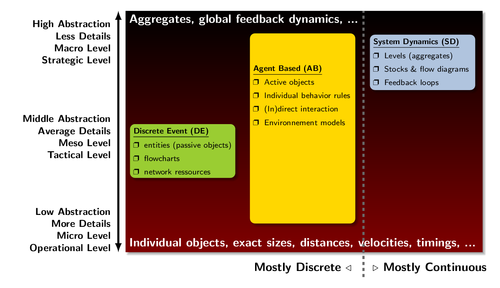This is the LaTeX version of the figure from the following link: https://en.wikipedia.org/wiki/AnyLogic#/media/File:Simulation_approaches_vs_abstraction_levels.jpg Note that the color range is slightly modified.
This example illustrates how modelling approaches correspond to the abstraction levels.

Edit and compile if you like:
% Simulation approaches versus abstraction levels
% Author: Valeria Borodin
\documentclass[border=10pt,svgnames]{standalone}
\usepackage{tikz}
\usetikzlibrary{positioning,shadows.blur}
\usepackage{pifont}
\renewcommand{\labelitemi}{\ding{112}}
\begin{document}
\begin{tikzpicture}
\tikzset{
box/.style = { rounded corners = 5pt,
align = left,
font = \sffamily\footnotesize,
text width = 3.45cm,
blur shadow = {shadow blur steps = 15} },
legend/.style = { font = \sffamily\bfseries,
align = right,
text width = 3.4cm},
}
\node [shade,
blur shadow = {shadow blur steps = 15},
text width = 1.01\textwidth,
top color = black,
bottom color = Maroon,
text = white,
font = \sffamily\bfseries\large] (A)
{Aggregates, global feedback dynamics, ... \\ \vspace{.6\textwidth}
Individual objects, exact sizes, distances, velocities, timings, ...};
\node [box, below left = -4.5cm and -3.85cm of A, fill = YellowGreen]
(DE)
{\underline{\bfseries Discrete Event (DE)}
\begin{itemize}
\setlength{\itemindent} {-.5cm}
\item entities (passive objects)
\item flowcharts
\item network ressources
\end{itemize}
};
\node [box, above right = -3.5cm and .5cm of DE,
minimum height=0.55\textwidth, fill = Gold, text depth = 0.35\textwidth]
(AB)
{ \underline{\bfseries Agent Based (AB)}
\begin{itemize} \setlength{\itemindent}{-.5cm}
\item Active objects
\item Individual behavior rules
\item (In)direct interaction
\item Environnement models
\end{itemize}
};
\node [box, above right = -2.cm and .5cm of AB, fill = LightSteelBlue]
(SD)
{ \underline{\bfseries System Dynamics (SD)}
\begin{itemize} \setlength{\itemindent}{-.5cm}
\item Levels (aggregates)
\item Stocks \& flow diagrams
\item Feedback loops
\end{itemize}
};
\node [legend, above left = -1.25cm and 4.75cm of AB] (HA)
{High Abstraction \\ Less Details \\ Macro Level \\ Strategic Level};
\node [legend, below = 1.5cm of HA] (MA)
{Middle Abstraction \\ Average Details \\ Meso Level \\ Tactical Level};
\node [legend, below = 1.5cm of MA] (LA)
{Low Abstraction \\ More Details \\ Micro Level \\ Operational Level};
\node [below = 1.25cm of AB, font = \sffamily\bfseries\large ] (d1)
{Mostly Discrete $\triangleleft$};
\node [right = .5cm of d1, font = \sffamily\bfseries\large ] (d2)
{$\triangleright$ Mostly Continuous };
\path [ draw, color = DimGray, dashed, line width = 2pt ]
(d1.south east) + (0.3cm,0) coordinate(x1) -- (x1|-A.north);
\path [draw, <->, >=latex, line width = 2pt ]
(A.south west) + (-0.25cm,0) coordinate(x2) -- (x2|-A.north);
\end{tikzpicture}
\end{document}Click to download: simulation-abstraction.tex • simulation-abstraction.pdf
Open in Overleaf: simulation-abstraction.tex